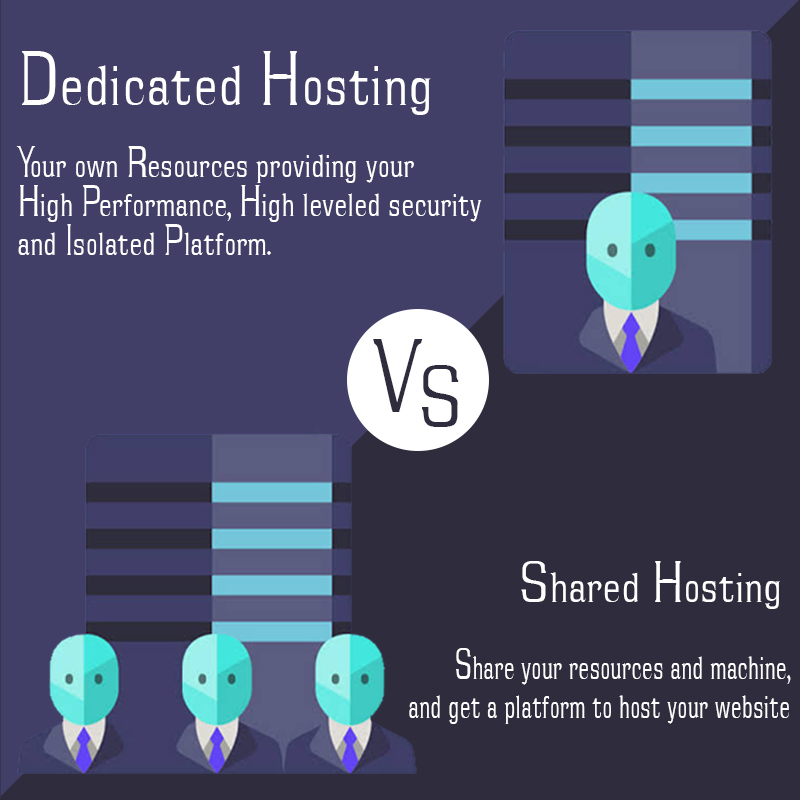Along with getting a website name, getting web hosting is one among the keys to fixing a replacement website, but what quite hosting is true for your site? New site builders can choose among an array of options starting from basic shared hosting to more specialized options, including highly customizable and really private dedicated hosting that provides users sole occupancy of one web server within the host’s network.</p >
Shared and dedicated hosting packages both offer ways to supply a web home base for a replacement website, but they’re designed for very different needs. Making the simplest hosting choice when making a WordPress website depends on factors including the dimensions and scope of your site and your plans for its future development. Below may be a comprehensive guide comparing shared hosting vs dedicated hosting services.
A Hosting Option for Every Need
All web hosting services operate an identical model. Account-holders websites are parked and maintained on servers owned by a foreign provider. Depending on the type of hosting package a user purchases, the online hosting provider is liable for the care and maintenance of the servers and providing various other services specified within the hosting plan.
When first-time site owners are advised to urge “web hosting,” this typically refers to shared hosting, the type of basic hosting package offered at low prices for brand spanking new site builders and owners of small sites. But most leading web hosting providers also offer other forms of hosting services, and a few providers focus exclusively on a specific type.
These more specialized hosting options include managed hosting, during which the host takes responsibility for many if not all the tasks of maintaining a site, virtual private server hosting, or VSP, which provides users a partitioned space for more privacy and control—and even hosting designed to support specific site builders like WordPress. These services offer ascending levels of privacy, security, and control over the set-up and management of the site—and with exclusive use of web server resources and an array of support services, dedicated hosting tops the list of hosting options for scalability, security, and adaptability. But this kind of hosting isn’t for everyone.
How Does Shared Hosting Work?
Shared hosting packages are offered by nearly every web hosting provider, often at astonishingly low prices for basic service. As the name indicates, multiple websites shared space on one server that’s maintained by the hosting provider. All the sites thereon server get an allotment of the server’s total available resources, like bandwidth, power, and memory. A shared server can host hundreds or maybe thousands of internet sites, and users can find out multiple sites on one hosting account.
The hosting provider takes care of things like providing basic user support, maintaining server hardware and software, and providing and updating basic security protocols. Shared hosting packages also can include multiple tiers offering combinations of features at higher prices, but users are typically liable for fixing and running their own sites. The obligations of hosting providers and account holders are beginning within the hosting contract.
Because numerous sites are often packed into one shared server, and since rock bottom tiers of shared hosting packages typically don’t offer many features or support services, providers can offer hosting packages for very low prices. That’s important for brand spanking new sites on a coffee budget, but shared hosting has some drawbacks that become more apparent as an internet site grows.
Shared Hosting Has Limitations
Shared hosting makes it possible for almost anyone to make a web presence, but sharing a server with numerous others can pose problems. Each site on the server is owned and operated independently, but malware or viruses that infect one website also can affect its neighbors if security isn’t tight. In this environment, hacking one site also can expose others within the vicinity to issues like identity and data theft.
All sites on a shared server need to draw from the server’s overall resources. That means events that pull quite a site’s allotted share, sort of a sudden surge in traffic, can cause others on the server to hamper or maybe crash. If a site continues to hog quite its allotment of server resources, the online host can terminate the account. Likewise, if a site attracts massive amounts of spam or creates other problems for the hosting environment, it is often locked out until site owners pack up the matter.
Shared hosting packages can work well for smallish sites with relatively low amounts of traffic, and for several website owners, this type of hosting solution is all they’ll ever need. But for sites that are “outgrowing” basic shared hosting, dedicated hosting provides virtually unlimited room for expansion, privacy, and control over every aspect of the location.
What is Dedicated Hosting?
Dedicated web hosting is at the opposite end of the hosting spectrum from shared hosting. In this model, a hosting provider rents one server with all its available resources to at least one client. With the exclusive use of a server, site owners are liberal to install any software they choose and manage the location as they want. Dedicated hosting packages vary in terms of the amount of support and maintenance they offer, but typically the provider takes responsibility for maintaining the server itself. The owner is on top of things of the setup and running of the location itself.
Dedicated hosting eliminates the issues that go along side shared hosting. Since no other sites are sharing the server, there’s no risk of exposure to malware, viruses, or other problems from neighboring sites. And that also means all the dedicated server’s resources become available in the least times, which reinforces site speed and improves stability.
